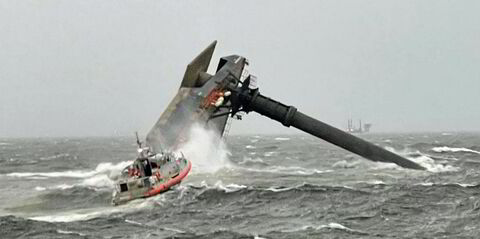If Saltchuk Resources succeeds in closing its takeover of the largest tanker owner in Jones Act shipping it will create a significant loss in this market for people like me: public information.
Overseas Shipholding Group, which agreed to a $950m take-private deal, is the last pure-play Jones Act tanker company, and second to last of the major players in this sector whose results are reported publicly.
After all, we saw Seacor Holdings, the parent of Seabulk Tankers, taken private in 2020.
Oslo-listed AMSC, a former owner of Jones Act tankers, exited the market last year when it sold its fleet of tankers to Maritime Partners. The company, previously known as American Shipping, played in this protected market by bareboat chartering its vessels to the likes of OSG and Keystone Shipping.
When OSG goes private — ending the need to update investors in quarterly reports, securities filings and press releases — it leaves only Kinder Morgan.
And for that company, focused primarily on pipelines and terminals, its American Petroleum Tankers subsidiary is but a small part of its portfolio.
The word “tanker” was used once in Kinder Morgan’s last earnings report and twice in its quarterly financial filing with the US Securities and Exchange Commission. The impact of that business was positive, with rising charter rates lifting earnings before depreciation and amortisation for the Houston company’s tanker business to $45m in the first quarter compared with $41m a year earlier.

So with OSG’s results headed into the dark of private ownership, let’s take a moment to look at what the company said in its latest earnings report about the Jones Act tanker market, because we may not have that opportunity again.
When OSG reported its $14.6m in first-quarter profits, which was an improvement on the $12.1m booked a year earlier, it also told investors that its Jones Act MR product tankers were earning just under $71,000 per day, all on term contracts in a market that is so tight there are no vessels available for spot contract.
A year earlier, the company’s ships were earning $55,500 per day in the spot market at $64.4m in term charters.
OSG’s articulated tug barges reeled in almost $48,000 per day in earnings in the term market during the latest quarter, up from $41,500 per day in the first three months of 2023.
The earnings growth is a reflection of a market that is benefiting from a global shake-up in petroleum supply chains.
“The persistent influence of geopolitical tensions outside of the US continues to severely disrupt historical trading patterns for crude oil and its refined products,” chief executive Sam Norton said in an earnings call earlier this month.

“Hostilities in the Red Sea, growing geopolitical tensions in the Persian Gulf, and the continuing war in Ukraine have kept international freight markets at or near historical highs.”
And he said the market strength is thought to be durable.
“High international freight rates indirectly stimulate domestically sourced fuel consumption, and by extension Jones Act transportation demand, since import substitution is constrained by comparatively high freight costs for product shipped over longer distances on foreign flag vessels,” Norton said.
“So long as international freight rates remain high, Buy America, when it comes to fuels, will have economic as well as rhetorical justifications.”
Norton also said OSG’s tankers have benefited from the growing shipments of renewable diesel and its feedstock components from the US Gulf Coast to western states. The demand boost has helped lead charterers to extend contracts, like the one that stretched a deal for the 46,900-dwt product tanker Overseas Nikiski (built 2009) by three years.
With details like that no longer a matter of public record, perhaps shipbrokers who thrive in a world of information arbitrage may not complain.
David St Amand, who writes an influential Jones Act tanker market report at his Navigistics Consulting, sees the downside.
“It makes my job a little tougher,” he said, although he noted that there will still be plenty of rumours to check out.
Those of us hungry for information about the Jones Act market will have to keep our ears to the ground.






